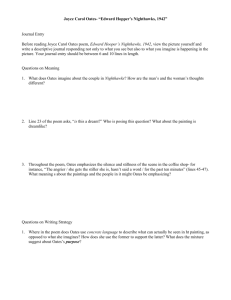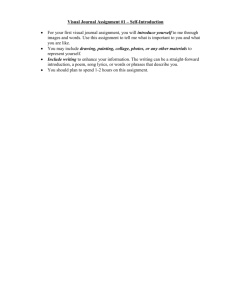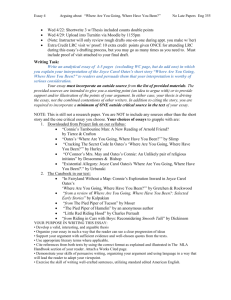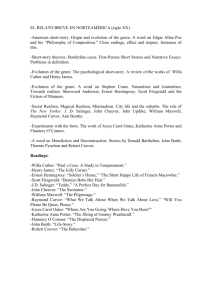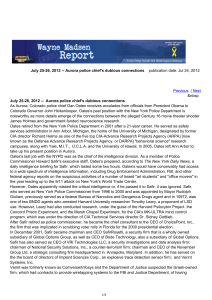Edward Hopper`s Nighthawks, 1942
advertisement
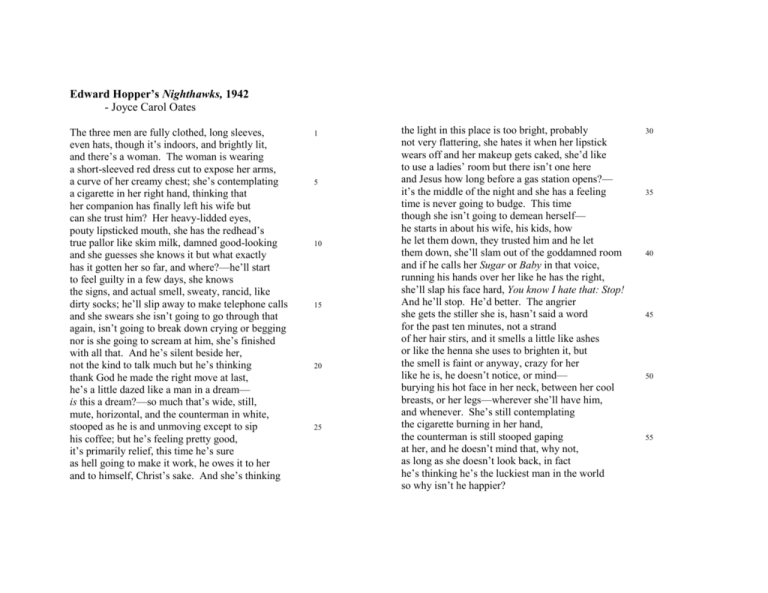
Edward Hopper’s Nighthawks, 1942 - Joyce Carol Oates The three men are fully clothed, long sleeves, even hats, though it’s indoors, and brightly lit, and there’s a woman. The woman is wearing a short-sleeved red dress cut to expose her arms, a curve of her creamy chest; she’s contemplating a cigarette in her right hand, thinking that her companion has finally left his wife but can she trust him? Her heavy-lidded eyes, pouty lipsticked mouth, she has the redhead’s true pallor like skim milk, damned good-looking and she guesses she knows it but what exactly has it gotten her so far, and where?—he’ll start to feel guilty in a few days, she knows the signs, and actual smell, sweaty, rancid, like dirty socks; he’ll slip away to make telephone calls and she swears she isn’t going to go through that again, isn’t going to break down crying or begging nor is she going to scream at him, she’s finished with all that. And he’s silent beside her, not the kind to talk much but he’s thinking thank God he made the right move at last, he’s a little dazed like a man in a dream— is this a dream?—so much that’s wide, still, mute, horizontal, and the counterman in white, stooped as he is and unmoving except to sip his coffee; but he’s feeling pretty good, it’s primarily relief, this time he’s sure as hell going to make it work, he owes it to her and to himself, Christ’s sake. And she’s thinking 1 5 10 15 20 25 the light in this place is too bright, probably not very flattering, she hates it when her lipstick wears off and her makeup gets caked, she’d like to use a ladies’ room but there isn’t one here and Jesus how long before a gas station opens?— it’s the middle of the night and she has a feeling time is never going to budge. This time though she isn’t going to demean herself— he starts in about his wife, his kids, how he let them down, they trusted him and he let them down, she’ll slam out of the goddamned room and if he calls her Sugar or Baby in that voice, running his hands over her like he has the right, she’ll slap his face hard, You know I hate that: Stop! And he’ll stop. He’d better. The angrier she gets the stiller she is, hasn’t said a word for the past ten minutes, not a strand of her hair stirs, and it smells a little like ashes or like the henna she uses to brighten it, but the smell is faint or anyway, crazy for her like he is, he doesn’t notice, or mind— burying his hot face in her neck, between her cool breasts, or her legs—wherever she’ll have him, and whenever. She’s still contemplating the cigarette burning in her hand, the counterman is still stooped gaping at her, and he doesn’t mind that, why not, as long as she doesn’t look back, in fact he’s thinking he’s the luckiest man in the world so why isn’t he happier? 30 35 40 45 50 55 RHETORICAL ANALYSIS QUESTIONS 1. Throughout the poem, Oates emphasizes the silence and stillness of the scene in the coffee shop—for instance, “The angrier/she gets the stiller she is, hasn’t said a word/for the past ten minutes (lines 45-47). What meanings about the painting and the people in it might Oates be emphasizing? 2. Where in the poem does Oates use concrete language to describe what can actually be seen in the painting, as opposed to what she imagines? How does she use the former to support the latter? What does the mixture suggest about Oates’s purpose? 3. The thoughts of the woman include some vivid sensory images. What are some examples? How do these thoughts contrast with the man’s? 4. What techniques of sentence structure does Oates use in lines 12-19 and 30-45 to suggest the woman’s rising anger? 5. The man’s and woman’s thoughts are peppered with strong language that some might find offensive. What does this suggest about how Oates sees the characters? WRITING ASSIGNMENT Find a painting that seems to you particularly intriguing or appealing. Then write a prose essay or a poem that expresses the painting’s appeal to you. You should imitate Oates by focusing on the thoughts of any figures in the painting. You should also describe the details of the painting and how they work together—be sure to effectively incorporate each of the 5 senses (effectively does NOT mean “smells like coffee” but instead “the scent of fresh coffee grounds wafted through the air). If you write a poem, don’t worry about the technical aspects of poetry (meter, rhyme, and the rest). Think instead about your choice of words and images, building the poem through description. Your prose/poem must be typed. You must also include a copy of the painting about which you are writing. It need not be in color; however, that does make it easier to understand your paper. You will be graded on your detail, description, and vivid images. This is due: __________________ 6. In lines 27-28, Oates writes that the man is “feeling pretty good,/primarily relief.” How does the word “relief” undercut the notion of “feeling pretty good”? This is worth: ______________pts.

